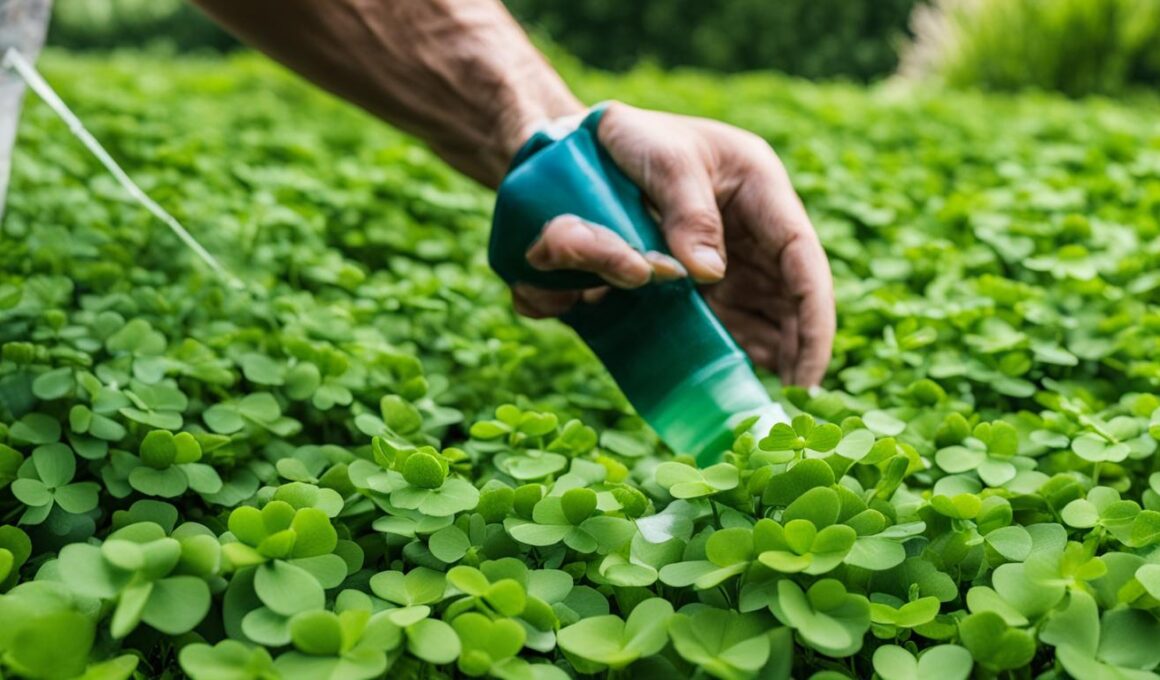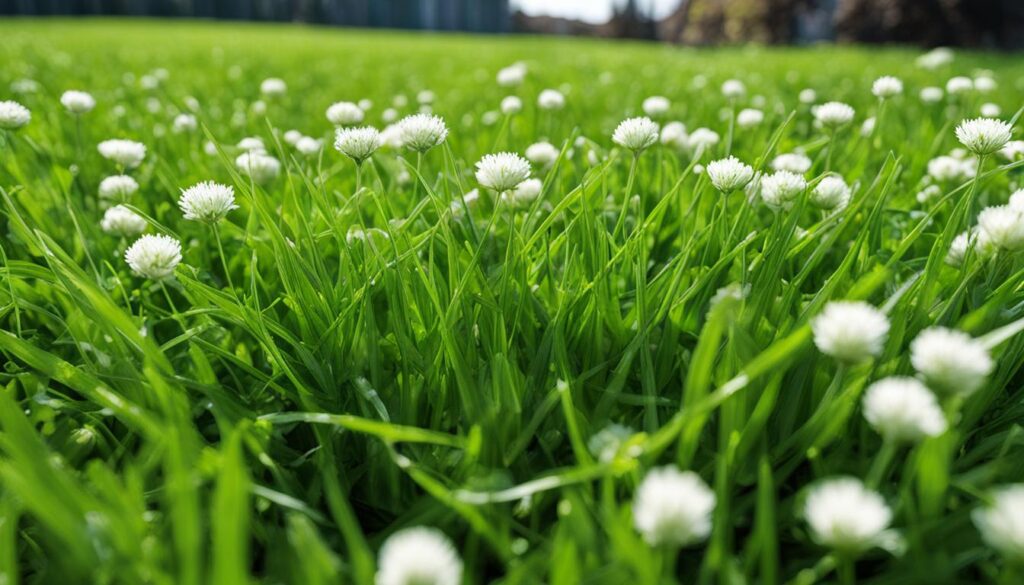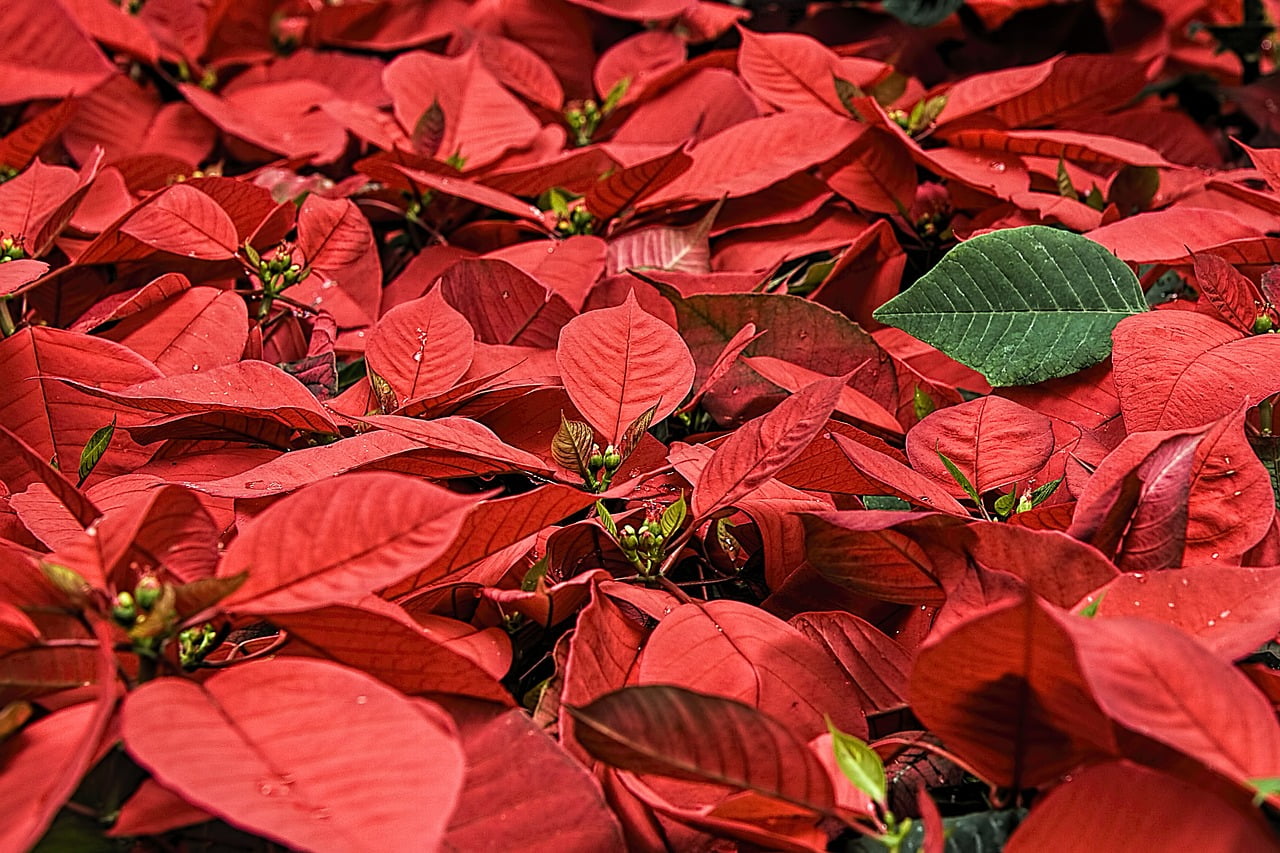If you’re dealing with a clover problem in your yard, there are several effective methods to get rid of clover without harming your grass. From manual removal to using natural remedies and herbicides, you have options to tackle your clover issue and restore a clover-free lawn. Here, we’ll explore seven ways to eliminate clover and regain control over your yard.
Post Summary
- Manual removal is a simple and DIY-friendly method to eliminate small patches of clover.
- A homemade vinegar mixture can be sprayed on clover patches to dry out and kill the plants.
- Boosting nitrogen levels in your lawn can deter clover growth by applying nitrogen-rich fertilizers.
- An organic herbicide like A.D.I.O.S can effectively get rid of clover without harming your grass.
- Adjusting your mowing height to 3 inches or higher can discourage clover growth and promote healthier grass.
Manual Removal
When it comes to getting rid of clover in your yard, manual removal is a simple yet effective method. By pulling out the clover by hand, you can eliminate the plant and its roots, preventing it from regrowing in the future. To manually remove clover, start by loosening the soil around the plant using a spade. Once the soil is loosened, firmly grasp the clover at its base and gently pull it out, ensuring that you remove all of its roots.
This method is natural and DIY-friendly, making it an ideal option for small patches of clover. It allows you to directly target the clover without harming your grass or surrounding plants. Manual removal is also a great way to spend some time outdoors and connect with your garden on a more personal level. So put on your gardening gloves and start pulling out that clover!
Remember, manual removal works best for small areas of clover. If you have a large infestation, consider combining this method with other strategies for more effective and long-lasting results. Now, let’s explore some other methods to tackle the clover problem in your yard.
Manual Removal Tips:
- Loosen the soil around the clover before pulling it out to make removal easier.
- Make sure to remove all of the clover’s roots to prevent regrowth.
- Dispose of the pulled-out clover properly to avoid reintroducing it to your yard.
- Regularly monitor your yard for new clover growth and remove it promptly.
| Method | Pros | Cons |
|---|---|---|
| Manual Removal | – Natural and DIY-friendly – Directly targets the clover – Prevents regrowth |
– Time-consuming for larger areas – Requires physical effort |
| Vinegar Mixture | – Environmentally friendly – Safe for pets and children |
– May require multiple applications – Can affect surrounding plants |
| Nitrogen Boost | – Discourages clover growth – Promotes overall lawn health |
– Needs targeted application – May affect other plants |
| A.D.I.O.S. Organic Herbicide | – Safe for surrounding grass – Can eliminate other weeds |
– Requires multiple applications – May need reapplication over time |
| Adjust Mowing Height | – Helps grass outcompete clover – Improves overall lawn appearance |
– May require adjusting mower settings – Requires regular maintenance |
| Corn Gluten | – Prevents clover seed germination – Organic and safe for lawns |
– Timing is crucial for effectiveness – May require multiple applications |
| Smothering Method | – Effective for larger clover patches – Helps reestablish grass in the area |
– Not suitable for small patches – Requires reseeding and additional care |
Vinegar Mixture
If you’re looking for a natural and environmentally friendly way to control clover in your yard, a vinegar-based mixture can be an effective solution. By combining vinegar, water, and dish soap in a spray bottle, you can create a homemade clover killer that is safe for your pets and children. Regularly spray the clover patches with this mixture for a few weeks, and the vinegar will dry out the clover leaves, eventually killing the plant.
Not only does the vinegar mixture offer a natural approach to clover control, but it also provides an easy DIY option. You can easily prepare the mixture at home using common household ingredients. This method is cost-effective and doesn’t require the use of harmful chemicals or herbicides.
Remember to apply the vinegar mixture directly to the clover patches and avoid spraying it on your desired grass or plants. With consistent application, you can effectively eliminate clover from your yard and regain control over your outdoor space.
Benefits of Using a Vinegar Mixture:
- Environmentally friendly
- Safe for pets and children
- No harmful chemicals
- Cost-effective
- Easy DIY option
Nitrogen Boost
One effective method to control clover in your lawn is by giving your grass a nitrogen boost. Clover thrives in soil with low nitrogen levels, so by applying a nitrogen-rich fertilizer specifically to the clover patches, you can discourage its growth and spread. There are several options available when it comes to nitrogen-rich fertilizers, including fast-release options and organic choices.
Fast-release fertilizers are a popular choice for controlling clover. They contain high levels of nitrogen that are quickly absorbed by the plants, providing an instant boost. However, it’s essential to follow the manufacturer’s instructions for application rates to avoid damaging your lawn. Organic options such as cow manure, bone meal, liquid kelp, blood meal, guano, and earthworm castings are also effective in discouraging clover growth. These natural fertilizers not only help control clover but also improve the overall health of your lawn.
To use a nitrogen-rich fertilizer to control clover, apply it directly to the problem areas. Follow the instructions on the packaging for the appropriate application rate and frequency. Be sure to target the clover without harming the rest of your lawn. With regular application, you’ll notice a reduction in clover growth as your grass becomes healthier and more robust.
Additional Tips:
- Mow your lawn regularly and at the recommended height to prevent clover from establishing itself.
- Water your lawn deeply and infrequently to encourage deep root growth in your grass, which will help outcompete the clover.
- Consider overseeding your lawn with grass varieties that are not as conducive to clover growth.
Comparison of Nitrogen-Rich Fertilizers
| Fertilizer Type | Benefits | Application |
|---|---|---|
| Fast-Release Synthetic Fertilizer | Quickly provides a nitrogen boost to your lawn | Follow manufacturer’s instructions for application rates |
| Cow Manure | Organic and adds nutrients to the soil | Spread evenly over the clover-infested areas |
| Bone Meal | Slow-release source of nitrogen | Apply according to package instructions |
| Liquid Kelp | Rich in nutrients and stimulates root growth | Mix with water and spray on the clover patches |
| Blood Meal | High in nitrogen and deters rabbits and deer | Apply as directed on the packaging |
| Guano | Rich in nitrogen and phosphorus | Apply by broadcasting over the clover-infested areas |
| Earthworm Castings | Improves soil structure and provides slow-release nutrients | Spread evenly over the clover patches |
A.D.I.O.S. Organic Herbicide
If you’re looking for a safe and non-toxic way to eliminate clover from your yard, consider using A.D.I.O.S. Organic Herbicide. This organic herbicide is specifically designed to target clover and other weeds without harming your grass or the environment. It provides effective weed control while maintaining the health and beauty of your lawn.
One of the key advantages of A.D.I.O.S. Organic Herbicide is its non-toxic nature. It is made from natural ingredients that are safe for pets, children, and the environment. Unlike chemical herbicides, it does not pose any risks to your family or the ecosystem. You can confidently use this organic herbicide to get rid of clover without worrying about any negative effects.
“A.D.I.O.S. Organic Herbicide is a game-changer in weed control. It effectively kills clover and other pesky weeds, providing a safe and non-toxic solution for homeowners. I highly recommend it for anyone looking to maintain a beautiful and weed-free lawn.” – Jane Smith, Lawn Care Expert
Using A.D.I.O.S. Organic Herbicide is easy and convenient. Simply follow the instructions on the package for application. Spray the herbicide directly onto the clover patches, ensuring thorough coverage. Within a few days, you will start to see the clover wilt and eventually die. It is a powerful and reliable solution for eliminating clover and restoring the health of your lawn.
| Benefits of A.D.I.O.S. Organic Herbicide | Features |
|---|---|
| Safe and non-toxic | Made from natural ingredients |
| Effective weed control | Selectively targets clover and other weeds |
| Easy to use | Simple application process |
| Environmentally friendly | No harm to pets, children, or the ecosystem |
With A.D.I.O.S. Organic Herbicide, you can say goodbye to clover in your yard and enjoy a lush and clover-free lawn. It is a safe, effective, and environmentally-friendly solution for weed control. Take control of your lawn and create a beautiful outdoor space with the help of A.D.I.O.S. Organic Herbicide.
Adjust Mowing Height
One simple yet effective way to prevent clover from taking over your lawn is by adjusting the mowing height. Clover tends to thrive in areas where the grass is less than 3 inches high. By setting your mower to a height of 3 inches or higher, you can discourage clover growth and promote healthier grass.
Taller grass has several advantages when it comes to outcompeting clover. Firstly, it shades the soil, making it harder for clover seeds to germinate and establish themselves. Additionally, taller grass has a more extensive root system, allowing it to absorb more nutrients and water, which helps it grow stronger and healthier. This, in turn, makes it more difficult for clover to establish itself and thrive.
Adjusting the mowing height is a simple step that can make a significant difference in preventing clover from spreading. By promoting healthy grass growth and creating an environment where clover struggles to thrive, you can keep your lawn clover-free and enjoy a lush, vibrant yard.
Benefits of Adjusting Mowing Height to Prevent Clover
By mowing your grass higher, you gain several benefits that help prevent clover from becoming a problem in your yard:
- Shaded soil: Taller grass shades the soil, making it less hospitable for clover seeds to sprout and grow.
- Stronger grass: Taller grass has a more extensive root system, giving it a competitive advantage over clover in accessing nutrients and water.
- Reduced weed growth: By maintaining a higher mowing height, you create an environment where weeds like clover struggle to establish themselves and take over your lawn.
Adjusting the mowing height is a simple and effective strategy to prevent clover from invading your lawn. It promotes the growth of healthy, dense grass that can outcompete clover and other weeds. By implementing this practice, you can enjoy a clover-free yard that is both beautiful and resilient.
Preventing Clover with Corn Gluten
If you’re looking for a natural and effective way to prevent clover from growing and spreading in your lawn, corn gluten can be a great solution. Corn gluten acts as a pre-emergent herbicide, meaning it stops clover seeds from sprouting and taking root in your lawn. By applying corn gluten, you can proactively prevent clover from becoming a problem and maintain a healthy, clover-free lawn.
Brief Overview of Corn Gluten as a Pre-Emergent Herbicide
Corn gluten is a natural byproduct of the corn milling process and is rich in nitrogen. It works by releasing organic peptides that inhibit the growth of clover seeds, preventing them from germinating and establishing a foothold in your lawn. Unlike synthetic herbicides, corn gluten is safe for your grass, pets, and children, making it an environmentally friendly option for clover control.
“Corn gluten is a fantastic natural alternative to chemical herbicides. It acts as a pre-emergent herbicide, meaning it stops clover seeds from sprouting, making it an effective way to prevent clover from taking over your lawn.” – Lawn Care Expert
To effectively use corn gluten as a clover preventer, apply 20 pounds of corn gluten meal per 1,000 square feet of lawn in early spring and fall. Water the area lightly to activate the corn gluten and help it release its inhibitory peptides. Regularly apply corn gluten as part of your lawn care routine to maintain its effectiveness and keep your lawn free from clover.
| Benefits of Corn Gluten as a Clover Preventer | Drawbacks of Corn Gluten as a Clover Preventer |
|---|---|
|
|
By utilizing corn gluten as a natural pre-emergent herbicide, you can effectively stop clover seeds from sprouting and prevent clover from becoming a problem in your lawn. Combine corn gluten application with other clover control methods, such as manual removal or adjusting your mowing height, for comprehensive clover management. With consistent care and maintenance, you can enjoy a lush, clover-free lawn throughout the year.
Smothering Method
If you’re dealing with larger patches of clover in your yard, the smothering method can be an effective way to eliminate it. This technique involves covering the clover with a garbage bag or plastic sheet, ensuring the edges are secured with bricks or rocks. Leave the covering in place for a few weeks to suffocate the clover. Once the smothering period is over, remove the covering and reseed the area with grass to fill in the space.
This method works by depriving the clover of sunlight, causing it to die off. It is important to note that the smothering method is best suited for larger clover patches and not recommended for small or irregular areas.
To successfully smother the clover, ensure that the covering is tightly secured, leaving no gaps for sunlight to penetrate. This will maximize the effectiveness of the smothering process and minimize the chances of the clover regrowing.
To effectively smother clover in your yard, cover it with plastic and reseed after the smothering period.
Comparison Table: Smothering Method vs. Manual Removal
| Method | Pros | Cons |
|---|---|---|
| Smothering Method |
|
|
| Manual Removal |
|
|
Conclusion
In conclusion, getting rid of clover in your yard is achievable with the right strategies and methods. Whether you opt for manual removal, vinegar mixtures, nitrogen boost, organic herbicides, adjusting mowing height, corn gluten, or the smothering method, there are various options to suit your preferences and lawn care goals.
By experimenting with different approaches, you can find the most effective solution for your specific clover problem. It is important to remember that maintaining a healthy lawn is key to preventing clover from returning. Regular mowing, proper fertilization, and keeping the grass at an optimal height will help in outcompeting clover and keeping it at bay.
So, take control of your yard and say goodbye to clover. Implement these strategies and enjoy a clover-free lawn that you can be proud of. Good luck with your gardening endeavors!
Will the same method used to get rid of petty spurge also work for clover?
If you’re wondering how to eliminate petty spurge, you might also be curious about using the same method for clover. While some tactics may work for both weeds, it’s important to research and find the most effective way to address each specific problem.
FAQ
What is the most natural way to get rid of clover in my yard?
Manual removal is the most natural method. Loosen the soil around the clover with a spade and pull it out, making sure to remove all the roots.
How can I make a homemade clover killer?
You can create a vinegar-based mixture by combining vinegar, water, and dish soap in a spray bottle. Regularly spray the clover patches with this mixture for a few weeks to dry out the clover leaves and eventually kill the plant.
What type of fertilizer should I use to discourage clover growth?
Apply a nitrogen-rich fertilizer specifically to the clover patches. Fast-release fertilizers and organic options like cow manure, bone meal, liquid kelp, blood meal, guano, and earthworm castings are effective in discouraging clover.
Is there a non-toxic herbicide I can use to kill clover?
Yes, you can use an organic herbicide like A.D.I.O.S. It effectively gets rid of clover and other weeds without harming your grass, pets, or children.
Will mowing my grass higher help prevent clover growth?
Yes, setting your mower to a height of 3 inches or higher will discourage clover growth and promote healthier grass. Taller grass will outcompete the clover and make it harder for the clover to establish itself.
How can I prevent clover from growing and spreading?
You can use corn gluten as a natural pre-emergent herbicide. Apply 20 pounds of corn gluten meal per 1,000 square feet of clover-infested lawn to release organic peptides that deter clover seeds from sprouting.
What is the smothering method for eliminating clover?
For larger patches of clover, you can cover it with a garbage bag or plastic sheet. Leave it in place for a few weeks to smother the clover, then remove the covering and reseed the area with grass.












